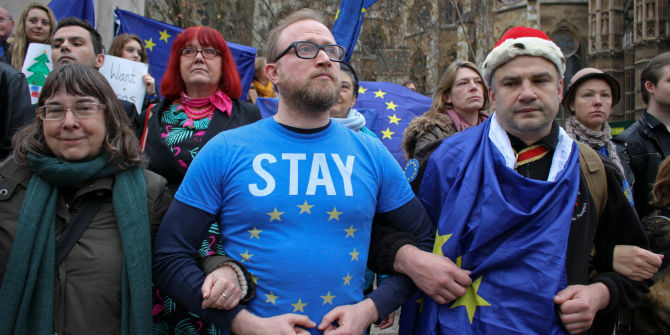 Guy Verhofstadt has mooted the idea of ‘associate citizenship’ for British citizens who wanted to keep it post-Brexit. Steve Peers says Verhofstadt not only lacks the authority to negotiate on this issue, but the chances of securing agreement from all other member states are pretty remote. He stands accused of raising false hopes. Nonetheless, were the EU to offer individual Britons such a deal, it would be very hard for the UK government to stop them accepting it.
Guy Verhofstadt has mooted the idea of ‘associate citizenship’ for British citizens who wanted to keep it post-Brexit. Steve Peers says Verhofstadt not only lacks the authority to negotiate on this issue, but the chances of securing agreement from all other member states are pretty remote. He stands accused of raising false hopes. Nonetheless, were the EU to offer individual Britons such a deal, it would be very hard for the UK government to stop them accepting it.
The idea of ‘associate citizenship’ for UK citizens in the EU post-Brexit has been much discussed in recent weeks. Presumably this would be offered not only to UK citizens in EU, but to other UK citizens too. It was first suggested by a Luxembourg MEP, and since then has been promoted by Guy Verhofstadt, who represents the European Parliament (EP) during Brexit talks.
Pro-EU protestors in London, December 2016. Photo: Steve Eason via a CC-BY-NC-SA 2.0 licence
The actual role for the EP is its power of consent (veto) over the final Article 50 treaty, as discussed further by Darren Harvey here. So Verhofstadt – if he has support from a majority of MEPs – could threaten a veto at the end of the process unless one of the EP’s demands are met. That’s significant, but not the same thing as being a negotiator.
The second big issue to unpick is the status of EU citizenship. Whenever it’s mentioned, a phalanx of keyboard warriors take to social media to argue ‘There’s no such thing as EU citizenship, because the EU is not a State’. This is clearly false, as Article 9 TEU shows:
In all its activities, the Union shall observe the principle of the equality of its citizens, who shall receive equal attention from its institutions, bodies, offices and agencies. Every national of a Member State shall be a citizen of the Union. Citizenship of the Union shall be additional to and not replace national citizenship.
So EU citizenship exists despite the EU not being a State (note that the ECJ has confirmed that the EU is not a State). However, that citizenship can only be obtained by means of holding citizenship of an EU Member State. It therefore seems obvious that UK citizens will lose EU citizenship after Brexit (unless they have dual nationality of an EU Member State), although some contest this interpretation.
It follows that ‘associate citizenship’ for UK citizens after Brexit is a new idea that would have to be established by way of Treaty amendment, entailing ratification by all Member States. Another route to this end would be for some or all Member States to agree formally or informally to offer their citizenship to UK citizens. Either route would give the full panoply of EU citizenship rights (free movement, voting, consular representation) to UK citizens. But equally either scenario sounds incredibly fanciful.
A simpler way forward is to aim to retain only some of the rights of EU citizenship for UK citizens – namely the free movement rights. Most of these rights could indeed be retained by adoption of an EU immigration law extending them to UK citizens, perhaps by means of a special ‘ex-EU’ status for all UK citizens, not just those living in the EU on Brexit Day. By way of exception, an EU immigration law could not address the issue of UK citizens entering the EU post-Brexit to work, since Article 79(5) TFEU leaves that issue up to Member States. However, a group of Member States could agree common rules on that between themselves.
Thirdly, as noted already, there’s nothing to ‘negotiate’ here – at least between the EU and the UK. All these scenarios are unilateral – the EU and its Member States can decide on what they want to offer to UK citizens (if anything) without approval from the UK – just as some UK citizens already have (or can obtain) dual citizenship of Ireland or other Member States. Of course, Member States may be unwilling to go down this road without some form of reciprocity from the UK, and the UK might be unwilling to offer that; but that is a purely political matter.
Next, what role does Verhofstadt actually have as a ‘negotiator’ here? Not much. Since any unilateral decision by the EU would not be negotiated with the UK (and Verhofstadt will not be ‘negotiating’ the Article 50 deal anyway), and the EP cannot directly force the other EU institutions or Member States to consider the idea of associate citizenship (in whatever form), there would be no explicit role for the EP unless the Commission tabled EU legislation. So it’s not clear why Verhofstadt makes a big fuss about this issue.
Maybe he simply wants the attention. That’s an understandable trait in a politician. However, there’s something not only cynical, but a little bit cruel, in raising false hopes. Unless Verhofstadt clarifies his objective and presents a plan for achieving it, he risks a backlash.
Finally, at least a few Leave supporters seem upset by this associate EU citizenship idea – although conversely some Leavers seem perfectly relaxed about it. But frankly, so what? If the EU made a unilateral offer to individual UK citizens, how could the UK government stop them accepting it? Even if the UK banned dual citizenship in general, or dual EU/UK citizenship in particular, the EU could still offer EU citizenship to UK citizens who were willing to denounce their UK citizenship to obtain it. If the UK then passed a law banning people from denouncing their UK citizenship to this end, there is no legal reason why the EU should recognise the effect of that law. If the UK then persecuted anyone who purported to denounce UK citizenship, those people could seek asylum in the EU.
Any Leavers who are really angry about the idea of UK citizens getting EU citizenship would be better off instead spending some time trying to understand why some of their fellow UK citizens value their EU citizenship so highly – and why all UK citizens should honour this country’s long history of respecting those with different points of view.
—
Note: This post represents the views of the author and not those of the LSE. It was first published at the EU Law Analysis blog, and was also re-posted on our sister site, the LSE Brexit blog.
 Steve Peers is Professor of EU Law & Human Rights Law, University of Essex.
Steve Peers is Professor of EU Law & Human Rights Law, University of Essex.








The idea of any british person keeping an eu citizenship after brexit is just another way of attempting to keep us in it. What possible advantage is there in being an eu citizen, would they have to pay twice as much income tax for their “duel nationality” and is it worth it for two weeks of the year pretending not to need a passport, although as the true Brits would need one how would you tell the difference? It is just something the whinging losers want to think would be good because they have been badly mislead by self serving politicians like Clegg.
I fundamentally dispute the automatic loss of EU citizenship through the Article 50 process. Firstly, on careful reading of the following statement, what logical deductions can be made:
“Every national of a Member State shall be a citizen of the Union.”
I put it to you that this means that when the treaty was ratified in 1993, I became a citizen of the political and economic entity that is the European Union. It does not say in this sentence, every person that is not a national of a member state shall not be a citizen of the union. There is no logical inference there in plain English.
“Citizenship of the Union shall be additional to and not replace national citizenship.”
The term addition has a specific meaning in English, it means another one. So Citizenship of the Union is additional to Citizenship of the United Kingdom. It does not replace it because it is another one.
Now we just need to look at some factual example of situations where the two citizenships are not always given together. So, British Citizens that live on the Channel Islands are not European Citizens. Likewise, European Citizens living on the Faroe Islands are not Danish citizens.
So it is perfectly clear and has been described this way in every legal judgement made by the ECJ that:
– EU citizenship is a personal status of a human being
– Acquisition and Loss of that status is regularly controlled at the national level by the nation state
– This status is distinct to the national citizenship
– Generally this status is lost when the national citizenship is lost
– There is no other legal mechanism of loosing EU citizenship
Now we look at Article 50. It does not mention EU citizens at all. Therefore, it is not an area that is open to discussion under QMV.
So the question is simple and needs to be resolved by the ECJ. Is EU citizenship a legal status in EU law or not?
If it is a status in EU law, then something has to happen to remove it. Like a law passed in the European Partliament, or something else.
If it is just the legal consequence of national membership, then it has no status in EU law and it will lapse if the national membership lapses.